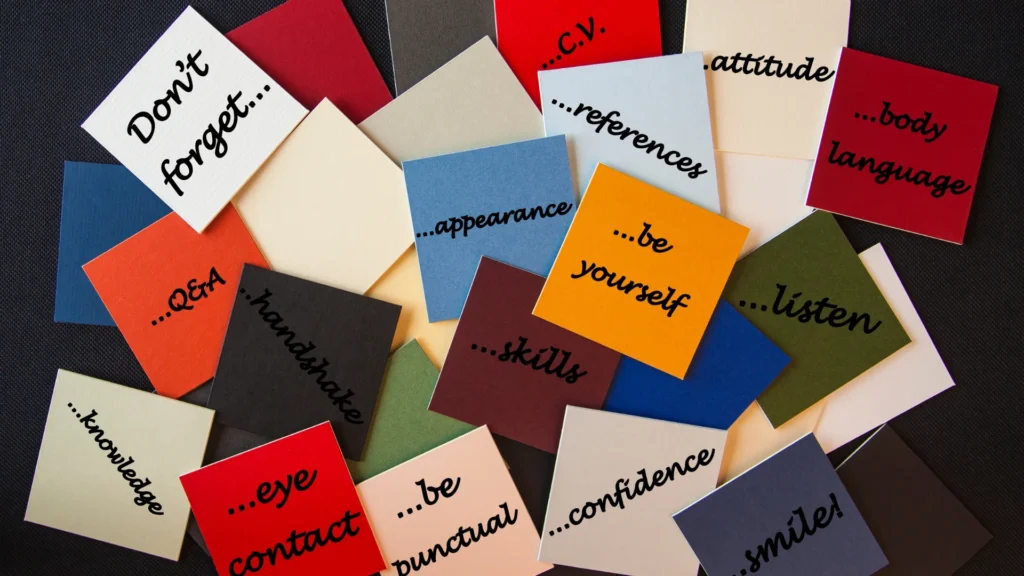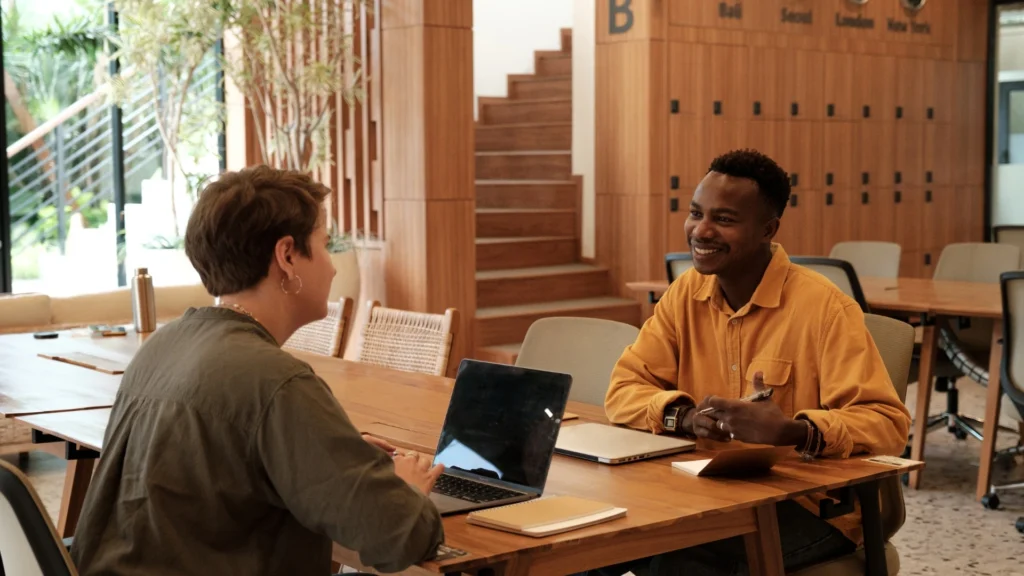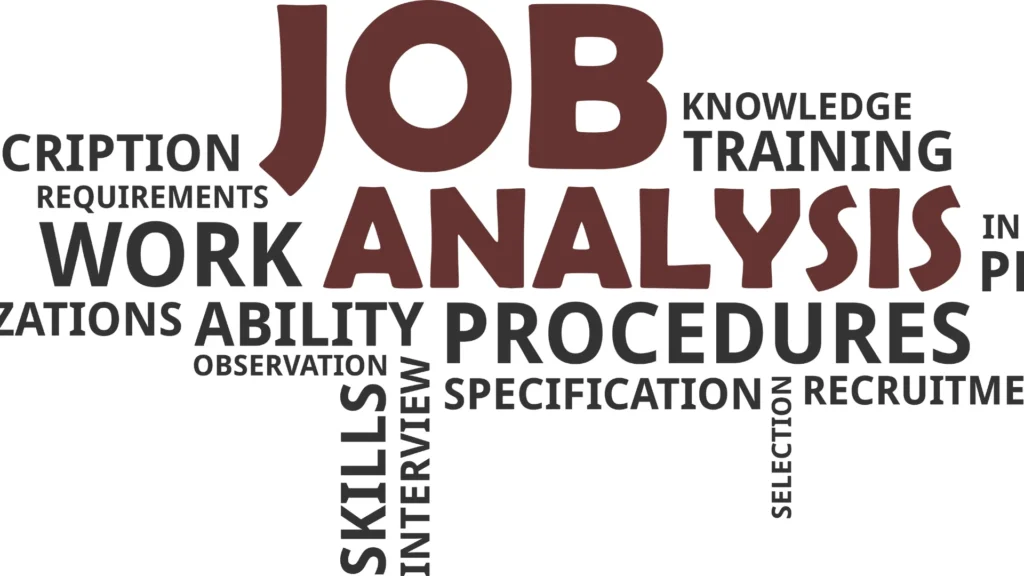This blog post delves into the ‘100 Words to Keep in Mind for Job Interview,’ offering a lexicon of success for job seekers. These words are more than mere terms; they are principles, strategies, and mindsets that, when embraced, can transform your interview from an interrogation into a conversation, from a test into an opportunity.
As you read on, you’ll discover the power of preparation, the impact of impression, and the significance of follow-through. Whether you’re a seasoned professional or stepping into the job market for the first time, these 100 words will equip you with the confidence and clarity needed to navigate the interview process and emerge victorious.
In this blog post, we’ll explore 100 words that can help you impress potential employers and showcase your communication skills. By incorporating these words into your responses, you can convey professionalism and confidence during your interview. Let’s dive in and equip you with the language tools you need to ace your next job interview.

Introduction: Mastering the Art of the Interview
The job interview is a pivotal moment in one’s career journey—a gateway to new opportunities and professional growth. It’s an art form where preparation meets opportunity, and words become the brushstrokes that paint your professional portrait. In this competitive landscape, every word counts, and the right vocabulary can set the stage for a successful encounter.
A strong vocabulary can make a big difference when preparing for a job interview. Entering a job interview can be nerve-wracking, but being well-prepared with keywords can be advantageous. By familiarizing yourself with 100 important words for job interviews, you can boost your confidence and impress potential employers.
These words cover a range of topics, from describing your strengths to articulating your goals. Understanding and incorporating these words into your interview responses can help you stand out from other candidates and increase your chances of landing the job. Let’s delve into the essential vocabulary to keep in mind for your next job interview.
Let’s embark on this journey together, unlocking the secrets to interview success, one word at a time.
100 Important Words for Job Interviews
Going to a job interview can make you nervous, but knowing some important words can help. Knowing the right words can make a big difference when you get ready for an interview. Learning 100 keywords for interviews can make you feel more sure of yourself and impress the people you might work for.
These words encapsulate the essence of a successful job interview, from the way you present yourself to how you interact with the interviewer. Keep them in mind to make a great impression!
Job interviews can be daunting, but remembering a few keywords can guide you through the process with confidence and poise. Here are 100 words that encapsulate the essence of a successful job interview.

Following are 100 words to keep in mind for job interview:
- Preparation – Research the company.
- Punctuality – Arrive early.
- Presentation – Dress appropriately.
- Positivity – Maintain a positive attitude.
- Politeness – Be courteous.
- Practice – Rehearse common questions.
- Precision – Give concise answers.
- Professionalism – Display work ethic.
- Passion – Show genuine interest.
- Performance – Highlight achievements.
- Potential – Discuss future contributions.
- Perspective – Understand company vision.
- Patience – Listen carefully.
- Proactivity – Ask insightful questions.
- Poise – Stay calm under pressure.
- Perseverance – Emphasize resilience.
- Personality – Let your character shine.
- Persuasion – Sell your skills.
- Preparedness – Bring necessary documents.
- Perception – Be aware of body language.
- Prudence – Avoid controversial topics.
- Privacy – Don’t overshare personal information.
- Praise – Acknowledge team efforts.
- Practicality – Offer real-world examples.
- Proficiency – Demonstrate expertise.
- Progress – Show continuous learning.
- Pliability – Adapt to new situations.
- Purpose – Know your career goals.
- Planning – Outline career path.
- Participation – Engage in the conversation.
- Perceptiveness – Read the interviewer’s cues.
- Perspicacity – Display sharp judgment.
- Pertinence – Keep answers relevant.
- Promise – Commit to company success.
- Prowess – Exhibit your strengths.
- Pragmatism – Be realistic.
- Purity – Maintain integrity.
- Peacefulness – Avoid arguments.
- Playfulness – Show a sense of humor.
- Philanthropy – Mention volunteer work.
- Pioneer – Embrace innovation.
- Pleasantness – Be agreeable.
- Prudence – Make wise decisions.
- Perfection – Strive for excellence.
- Punctiliousness – Pay attention to detail.
- Popularity – Be likable.
- Permanence – Express long-term interest.
- Purity – Be honest.
- Pacifism – Promote harmony.
- Patriotism – Respect company culture.
- Practicality – Suggest actionable ideas.
- Punctuality – Value time.
- Perseverance – Show determination.
- Pliability – Be flexible.
- Prestige – Respect the company’s reputation.
- Privacy – Respect confidentiality.
- Proximity – Relate to the company’s location.
- Purity – Be sincere.
- Pleasure – Enjoy the process.
- Pacification – Calm any concerns.
- Praise – Compliment the company’s achievements.
- Practicality – Focus on what you can do.
- Punctuality – Never be late.
- Perseverance – Never give up.
- Pliability – Adjust to the company’s needs.
- Prestige – Aim for high standards.
- Privacy – Keep company secrets.
- Proximity – Show local knowledge.
- Purity – Avoid deceit.
- Pleasure – Show enthusiasm.
- Pacification – Ease any doubts.
- Praise – Recognize good leadership.
- Practicality – Be down-to-earth.
- Punctuality – Time management is key.
- Perseverance – Overcome challenges.
- Pliability – Embrace change.
- Prestige – Honor traditions.
- Privacy – Secure personal data.
- Proximity – Connect with local community.
- Purity – Clear communication.
- Pleasure – Positive experiences.
- Pacification – Resolve conflicts.
- Praise – Value contributions.
- Practicality – Implement solutions.
- Punctuality – Schedule effectively.
- Perseverance – Endure hardships.
- Pliability – Adapt strategies.
- Prestige – Uphold quality.
- Privacy – Protect information.
- Proximity – Align with goals.
- Purity – Genuine intentions.
- Pleasure – Find joy in work.
- Pacification – Maintain peace.
- Praise – Applaud successes.
- Practicality – Utilize resources.
- Punctuality – Be on time.
- Perseverance – Persist in adversity.
- Pliability – Modify approaches.
- Prestige – Seek excellence.
- Privacy – Discretion is vital.
Each word represents a trait or action that can significantly impact the outcome of your interview. From the way you present yourself to how you interact with the interviewer, these words serve as a roadmap to making a great impression.
Remember, an interview is not just about answering questions; it’s about presenting yourself as the best candidate for the job. By keeping these 100 words in mind, you’ll be well on your way to acing your next job interview.
Interview Mindset: Cultivating the Right Attitude
Entering an interview with the right mindset can make all the difference. It’s not just about the words you say, but also about the energy and confidence you convey. Here are some key points to help cultivate the right attitude:
- Confidence – Believe in your abilities and qualifications.
- Calmness – Keep your nerves in check and stay composed.
- Clarity – Think clearly and articulate your thoughts well.
- Conciseness – Be brief yet thorough in your responses.
- Curiosity – Show interest in the company and the role.
- Commitment – Demonstrate your dedication to your career and the potential job.
- Composure – Maintain your poise, even when faced with unexpected questions.
- Connection – Build rapport with your interviewer; it’s a two-way street.
By embodying these qualities, you’ll present yourself as a well-rounded and desirable candidate. Remember, the interview is as much about assessing fit and compatibility as it is about skills and experience.

Interviews can present a variety of challenges, and being prepared for them can set you apart from other candidates. Here are some common hurdles and how to handle them:
- Unexpected Questions – Sometimes, interviewers ask questions designed to see how you think on your feet. Stay calm, take a moment to gather your thoughts, and provide a thoughtful response.
- Technical Difficulties – For virtual interviews, technical issues can arise. Test your equipment beforehand, ensure a stable internet connection, and have a backup plan, like a phone interview option.
- Behavioral Questions – These questions assess how you’ve handled situations in the past. Use the STAR method (Situation, Task, Action, Result) to structure your answers.
- Salary Negotiation – Be prepared to discuss compensation. Research industry standards, know your worth, and be ready to negotiate respectfully.
By anticipating these challenges, you can navigate the interview with confidence and demonstrate your problem-solving skills.
Leveraging Your Network
Your professional network can be a valuable resource when preparing for interviews. Here’s how to make the most of it:
- Mentor Advice – Seek guidance from mentors who can provide insights and advice based on their own experiences.
- Peer Mock Interviews – Practice with friends or colleagues who can give you constructive feedback.
- Industry Insights – Connect with professionals in your field to learn about current trends and expectations.
- Alumni Networks – Tap into alumni from your alma mater who can offer support and potentially advocate for you.
Utilizing your network not only helps you prepare but also expands your reach and potential opportunities.
After the Interview: Next Steps and Follow-Up
What you do after the interview can be just as important as how you perform during it. Here’s how to effectively follow up and take the right steps post-interview:
- Thankfulness – Send a thank-you note to express gratitude for the opportunity.
- Thoughtfulness – Reflect on the interview and consider what went well and what could be improved.
- Timeliness – Follow up promptly, but don’t be overbearing; give the interviewer time to make their decision.
- Tactfulness – Be diplomatic and professional in all your communications.
- Tenacity – If you don’t get the job, don’t be discouraged. Use the experience to prepare better for the next opportunity.
- Transparency – If you have other offers or need to make a decision soon, communicate this clearly and respectfully.
- Tact – If you receive a rejection, respond graciously. You never know when another opportunity might arise with the same company.
By taking these steps, you’ll ensure that you leave a lasting positive impression, which could be beneficial for future opportunities.
This FAQ section addresses common concerns and questions that candidates may have when preparing for job interviews. It’s designed to be a quick reference guide that complements the detailed tips provided in the main content of your blog post.
Q: How can I best prepare for a job interview?
A: Start by researching the company, understanding the job role, and reviewing common interview questions. Practice your answers, but keep them flexible enough to adapt to the conversation.
Q: What should I wear to an interview?
A: Dress professionally and in alignment with the company’s culture. When in doubt, it’s better to be slightly overdressed than underdressed.
Q: How early should I arrive for my interview?
A: Aim to arrive 10-15 minutes early. This shows punctuality and gives you a moment to relax and prepare mentally.
Q: What are some good questions to ask the interviewer?
A: Ask about the company’s culture, the team you’ll be working with, and the challenges and opportunities the role presents. Inquire about the next steps in the hiring process.
Q: How do I handle a question about my weaknesses?
A: Be honest but strategic. Choose a weakness that is not a core requirement of the job and discuss how you’re working to improve it.
Q: Is it acceptable to negotiate my salary during the first interview?
A: It’s usually best to wait until a job offer is made before negotiating salary. However, if the interviewer brings it up, be prepared to discuss it.
Q: What should I do if I don’t know the answer to a question?
A: It’s okay to admit you don’t know something. Express your willingness to find out or describe how you would go about solving the problem.
Q: How do I follow up after an interview?
A: Send a thank-you email within 24 hours, reiterating your interest in the position and reflecting on the interview conversation.
Q: What if I get nervous during the interview?
A: Take deep breaths and pause before answering if you need a moment. Remember that it’s okay to be nervous and that preparation can help you feel more confident.
Q: Can I bring notes to an interview?
A: Yes, it’s acceptable to bring a notepad with notes or questions you have for the interviewer. It shows you’re prepared and engaged.
Read More:
- Rise of AI Interviews in Modern Recruitment: Digital Hiring New Guide
- Top 30 Work-From-Anywhere Jobs: Criteria Salary Professions Future – The Ultimate Guide
- Ex-Amazon HR Reveals Five Ways Candidates Can Answer Difficult Questions in Job Interviews
Conclusion: Your Interview Vocabulary for Success
As we wrap up our exploration of the ‘100 Words to Keep in Mind for Job Interview Tips,’ it’s clear that the language we use is a powerful tool in shaping our destiny. Each word we’ve discussed is a stepping stone towards presenting your best self to potential employers. They are not just words; they are the embodiment of your professional ethos and the narrative of your career.
Remember, interviews are a two-way street. They are as much about you assessing the company as they are about the company assessing you. Use these words to articulate not only your competence but also your compatibility with the company’s culture and values.
Incorporate these words into your interview strategy, and you will find that they become second nature. With preparation, practice, and a positive approach, you can turn any interview into a compelling conversation and an opportunity to advance your career.
Thank you for joining us on this journey through the art of the interview. May these words be your allies, and may your career path be bright and successful. Go forth with confidence, and let your words open doors to new beginnings.